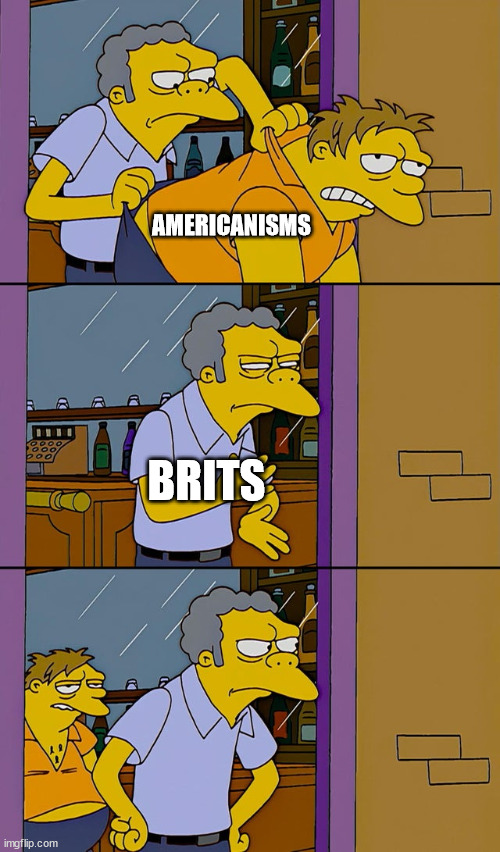American vs British English: differences explained
Learn about the differences within the common language that divides two nations, leading to much confusion and gnashing of teeth.
Adam Woodard
4 min read


The differences between American vs British English can be confusing for natives of either, in addition to baffling non-native speakers trying to get to grips with the language. In many cases, American English is more familiar to non-native speakers and some British idiosyncrasies can appear novel. Of course, this goes beyond accents, as each nation boasts a myriad of local accents. If you’re interested in knowing how to spot some common differences, read on to find out.
Spelling
One of the easiest differences to spot is spelling, as there are certain patterns or rules that are quite noticeable. One of these is the British use of an s where an American would use a z, particularly in verbs. For instance:
American: organize, vocalize, stigmatize, theorize, jeopardize
British: organise, vocalise, stigmatise, theorise, jeopardise
Arguably, the American spelling is closer to the actual pronunciation, but this barely compensates for the nightmare that is English pronunciation for learners.
Another spelling difference is the absence of the letter u in words that, in their British English version, have an ou. Some common examples include:
American: color, honor, humor, flavor, neighbor, labor
British: colour, honour, humour, flavour, neighbour, labour
The third common example that’s easy to spot is the American use of an s where Brits use c. Take a look:
American: defense, offense, license
British: defence, offence, licence
This one gets a little weird, especially when you consider that British English uses ‘practice’ for the noun and ‘practise’ for the verb, but American English decides to retain ‘practice’ for both. Go figure.
Then there’s just some odd differences that don’t necessarily follow a pattern. Here are some examples:
American: tire, pajamas, skeptical, dialog, jewelry, check, donut, program, gray
British: tyre, pyjamas, sceptical, dialogue, jewellery, cheque, doughnut, programme, grey
There appears to be some attempt on the part of American English to be more phonetic in some cases, which could make it more intuitive for learners.
Vocabulary
American vs British vocabulary can be an interesting one, but there are typically no rules to follow, so you just need to know the equivalents. Some make more sense on one side than the other, while others just seem like one side was being spiteful to the other. Here are some equivalent words from either side of the pond:
American – British
Truck – Lorry
Elevator – Lift
Diaper – Nappy
Cookie – Biscuit
Trash – Rubbish
Sidewalk – Pavement
Gasoline – Petrol
Vacation – Holiday
Eraser – Rubber
The last one can lead to some amusing misunderstandings in the States; if you know, you know. Elevator versus lift seems redundant, as elevate and lift essentially mean the same thing. Sidewalk sounds like it became necessary because pedestrians kept walking in the middle of the road. Calling a liquid gas(oline) sounds odd to some Brits, but then again pronouncing tomato and potato differently is also strange when considered objectively. The one almost everyone knows, of course, is that soccer is the American word for football. In America, the latter is a word for a sport that predominantly involves the use of athletes’ hands.
Expressions
You may have discerned by now that I’m a British English speaker and have some bias in that direction. But it’s in expressions and idioms that I find my bias disappearing, as this is language evolution at its most fascinating. Some may even surprise people when they learn that they’re American in origin, like jumping on the bandwagon and spilling the beans. Bang for your buck and a dime a dozen are more transparently American but have a unique usefulness. A ballbark figure is also an American expression, as is scoot over.
British expressions probably see less frequent international use, but I’ve found people quite like the novelty – so we’ve got that going for us, at least. Examples include popping over for something, being dead as a doornail, going off at half-cock (stop laughing, Americans), something costing an arm and a leg, and a person not playing with a full deck.
A related difference is the additional words Americans inject where Brits and others wouldn't feel the need. This is perhaps most noticeable in the use of with. For instance, a Brit would say I'll consult my partner whereas an American would say I'll consult with my partner.
The phenomenon of Americanisms
An Americanism is an American expression or word that has somehow crept into other variants of English. Some British English speakers dislike Americanisms intensely and believe they're corrupting the language. Others simply see it as the natural evolution of a language whose native speakers overwhelmingly inhabit places beyond the British Isles, a characteristic shared by other European languages like French, Spanish, and Portuguese.
Some Americanisms are understandably unfit-for-purpose in the UK, such as fanny pack (stop laughing, Brits). My favourite is the use of douchebag to refer to someone uniquely unpleasant, as it does conjure up a rather specific image. That being said, there are some ‘Britishisms’ that have crept into American English. The word bonkers used to be much rarer among American speakers, but you may hear it more often now.
Aside from the expressions we went through earlier, other Americanisms are becoming increasingly popular on the eastern side of the pond. Some are just vocabulary, like movie rather than film. Others may or may not have an American origin, like saying can I get a coffee instead of may I have a coffee or I'd like a coffee.
Ultimately, languages change and the English language appers to do so with great alacrity. The majority of English speakers worldwide (native and non-native) are probably more familiar with American English and that's likely to have a significant impact on its future evolution. We're even seeing hybridised forms of the language like Chinglish and Spanglish take on their own unique character.
I believe there's little benefit in resenting these changes, and one can retain their own variant of English while also appreciating others. But if you'd like to see the resistance in action, you'll enjoy this BBC article on the subject of Americanisms and how non-Americans sometimes don't take kindly to them.


